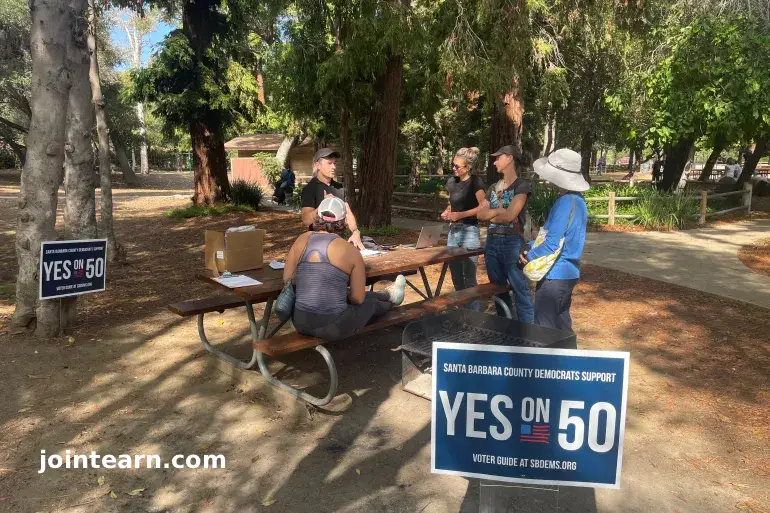
Democrats Mobilize for Proposition 50 to Counter Partisan Redistricting
In the lead-up to the November 4 California ballot, Democrats are rallying support for Proposition 50, a controversial measure aimed at redrawing congressional districts in the state to counter Republican gerrymandering efforts influenced by former President Donald Trump.
Volunteers like Aubrie Lugo, canvassing in Goleta, California, describe their efforts as part of a broader fight to safeguard democracy. “We’re trying to fight the rigging of our democracy,” Lugo said, highlighting the national stakes of the ballot measure.
Proposition 50 proposes a temporary suspension of California’s nonpartisan Citizens Redistricting Commission, allowing the state legislature to draw a congressional map designed to net the Democratic Party five additional seats in the U.S. House of Representatives. Proponents argue the move is necessary to prevent Republican-controlled states from dominating midterm elections through partisan maps.
Background: A Response to Texas
The initiative is a direct response to redistricting moves in Republican strongholds such as Texas, where the Trump administration reportedly pressured legislators to redraw congressional districts favoring Republicans ahead of the 2026 midterm elections.
Currently, Republicans hold a slim House majority of 219 seats, just six more than Democrats. New partisan maps in red-leaning states like North Carolina and Missouri have further fueled concerns that Democratic voters could be systematically disadvantaged at the federal level.
California Governor Gavin Newsom emphasized the urgency, stating that Democrats could not “unilaterally disarm” while Republican states pursue partisan redistricting. The measure would apply to congressional maps for 2026, 2028, and 2030, with voters retaining the final say on whether to adopt the legislative maps.
National Attention and High-Profile Support
Proposition 50 has attracted attention beyond California, drawing endorsements from national figures such as Barack Obama and Alexandria Ocasio-Cortez. Obama emphasized the measure’s importance, warning that its outcome could affect the broader political balance in the United States.
“Prop 50 levels the playing field and gives power back to the people,” Ocasio-Cortez said, framing the initiative as a necessary safeguard against Republican power grabs.
Meanwhile, President Trump criticized the measure as “dishonest” and ordered federal observers to monitor the election, a move Governor Newsom called voter intimidation. The clash reflects ongoing tensions over election integrity and partisan influence at both the state and federal levels.
Opposition and Concerns About Escalation
Critics argue that Proposition 50 could exacerbate partisan tensions and erode voter confidence. Former California Governor Arnold Schwarzenegger cautioned that such tit-for-tat redistricting escalates national political conflicts:
“There’s this war going on all over the United States. Who can out-cheat the other one?” Schwarzenegger said, highlighting concerns that the initiative may undermine long-term electoral fairness.
Experts like Samuel Wang, director of the Princeton Gerrymandering Project, stress the risks of bypassing independent redistricting commissions, which historically produce fairer maps than legislatures. He notes that voters face a trade-off: safeguarding local representation versus addressing national political imbalances.
Proposition 50’s Potential Impact
If passed, Proposition 50 could significantly alter California’s congressional landscape. Analysts estimate that competitive districts would decline sharply, with only a handful remaining closely contested, reshaping California’s influence in the U.S. House of Representatives.
The ballot measure underscores Democrats’ willingness to take bold steps to counter Trump-era tactics, while highlighting the continuing tension between national-level strategies and local electoral fairness.
As the November 4 vote approaches, California voters will determine whether Proposition 50 passes, potentially setting a precedent for other states facing partisan redistricting battles.


Leave a Reply